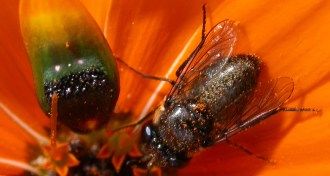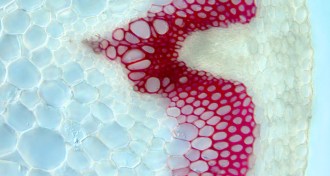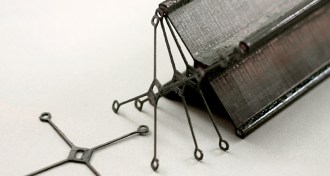Uncategorized
-
 Ecosystems
EcosystemsAging European forests full to the brim with carbon
Trees' capacity to sequester carbon dioxide from the atmosphere is dwindling.
By Meghan Rosen -
 Plants
PlantsDastardly daisies
This flower isn’t just any old sex cheat. It can be sexually deceptive three ways and in 3-D.
By Susan Milius -
 Health & Medicine
Health & MedicinePower of sugar may come from the mind
Only people who believe exertion zaps willpower get a boost from glucose.
-

Killer whales, grandmas and what men want: Evolutionary biologists consider menopause
Menopause seems like a cruel prank that Mother Nature plays on women. First come the hot flashes, night sweats, vaginal dryness, irregular periods, irritability and weight gain. Then menstruation stops and fertility ends. Why, many women ask, must they suffer through this? Evolutionary biologists, it turns out, ask themselves more or less the same question. […]
By Erin Wayman -
 Climate
ClimateFlood damage to cost up to $1 trillion per year by 2050
Coastal cities with growing populations will be inundated by sea level rise.
-
 Life
LifeYears or decades later, flu exposure still prompts immunity
New forms of influenza viruses can spur production of antibodies to past pandemics in people who lived through them.
-
 Life
LifeTo make biofuel, cut the lignin
Researchers disable key protein making plant sugars easier to access.
By Meghan Rosen -
 Materials Science
Materials ScienceToylike blocks make lightweight, strong structures
Bucking trend toward reducing numbers of parts, MIT engineers suggest building planes from thousands of identical pieces.
By Meghan Rosen -
 Climate
ClimateClimate change carved canyons in Andes
Erosion came thanks to cooling and more rain, not tectonic activity.
By Erin Wayman -
 Planetary Science
Planetary ScienceNASA gives up on fixing Kepler
Space telescope’s days as a premier planet hunter are over.
By Andrew Grant -
 Psychology
PsychologyHighlights from the American Sociological Association annual meeting
Research on social media's reluctant users, marital ideals and single parenthood and intimate victims of cybernastiness presented August 10-13 in New York City.
By Bruce Bower -
 Health & Medicine
Health & MedicineClues emerge to explain allergic asthma
Tests in mice reveal that allergens can trigger inflammation by cleaving a clotting protein.
By Nathan Seppa